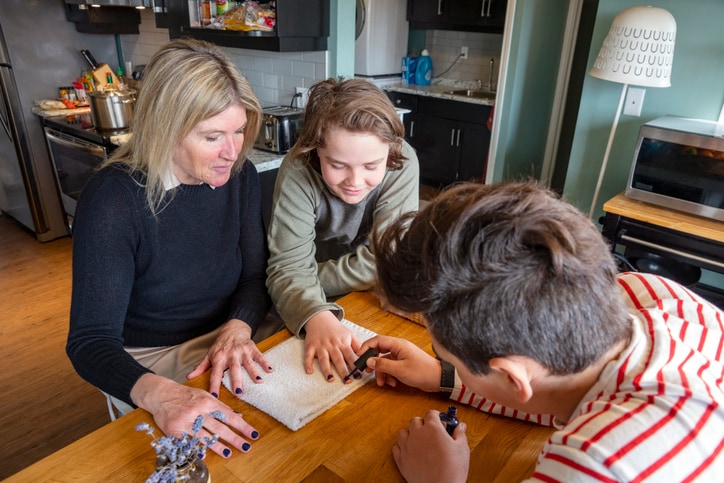Making new friends as a family in a new city takes a lot of effort and intentionality, according to Liz Lin, a psychologist and parent of two who moved with her family from California to Ann Arbor, Michigan. “Everyone at this stage is so busy with kids and work that you have to be intentional and proactive about creating opportunities to connect.”
And though there is much overlap, making friends and becoming a part of the community are not necessarily the same thing — but both require work for the transition to happen smoothly. Making new friends entails taking chances on clicking with others, while establishing a sense of connection to a new hometown necessitates nurturing familiarity, reestablishing routines and creating new ones. Building this sense of belonging will take some time and most likely will be a different experience for each member of the family.
Looking for ways for your family to spread roots and make connections after a move with kids? Ahead, mental health experts and parents share seven ways to meet people and make friends in a new city and proactively build community, along with some other helpful reminders.
1. Find new favorite places to continue old traditions
“Make an adventure out of finding new favorite places,” recommends Nicola Curtin, a therapist at The Women’s Center of Southeastern Michigan and a parent of two kids, who recently moved from the West Coast. “We moved in the middle of the pandemic, so it was really hard to connect with other kids and there was no in-person school, but trying to find the best local playground, new nature places we loved, etc… was really key to feeling a sense of connection to our new city.”
Finding a new favorite breakfast spot, the best pumpkin patch, a new hiking trail or a go-to donut shop can help re-establish family rituals to reduce the sense of loss. Claiming favorite spots again will make a big difference in cultivating a sense of familiarity, belonging and ownership.
2. Be in the loop, locally
Jennifer Tang, a licensed clinical psychologist and director of Everwell Health and Counseling, says, “Find local community papers or social media pages that publish community events or organizations that might be of interest to the family, like festivals, family days, art fairs, holiday events and more.” Knowing what is going on around town can help make you feel like a local.
3. Join a community center, house of worship or small gym
Basically, get out there! Regularly frequenting places where you will run into the same people will also nurture familiarity and connections. “Take the time to assess what feels right and compatible with your life and your family,” says Tzivy Reiter, a licensed clinical social worker and director of children’s and trauma services for Ohel Zachter Family National Trauma Center in New York. “You may choose to end some of these associations, and you may find yourself building lifelong connections.”
4. Volunteer
Tang recommends getting involved at school if your family has school-aged children. This could mean anything from attending school functions to joining the PTO. Getting involved in neighborhood associations or local nonprofits will also serve the double function of helping your family meet people and build a connection to the community.
5. Use your existing social network
Don’t forget about the people you already know. Loved ones are usually more than happy to make introductions. “I was very, very lucky that when we were about to move here, a friend from college introduced me to someone who had just moved to Ann Arbor and had a kid around the same age as one of mine,” says Lin. “We talked on the phone before I moved, and she’s been my closest friend here ever since.”
Chances are, you know someone who knows someone in your new town. Being proactive and taking initiative by connecting before your move can really pay off in forming initial or even lasting connections.
6. Try an app, a Facebook group or a support group
“Most cities have parent Facebook groups; they can be chaotic, but they can also be places to find families with similar interests or identities,” explains Lin, who started a group specifically for Black, Indigenous, People of Color (BIPOC) moms and nonbinary parents when she identified a need for one.
“The support and resources the group has provided online have been invaluable, and the group also hosts family events and gatherings where folks have been able to connect in real life,” she adds. “So if you’re looking for a starting point, I would recommend looking online, and if you can’t find the community you’re looking for there, start one!”
Places to get started include apps and groups like:
- Peanuts App, a community for all women, specifically those navigating fertility, pregnancy, motherhood or menopause.
- Meetup, also available as an app, helps people to come together around common interests.
- Facebook affinity groups like Modern Asian Moms (an enormous group with over 30,000 members for modern Asian moms all over the world), whether large or small, typically include local networking threads within groups to help you find other families in your area.
- PEPS Network, an affiliated group of nine nonprofits that offer early parenting support, with organizations in Seattle, Austin, Anchorage, Washington, D.C. and more.
- Local hospitals also often offer parent support groups.
7. Organize a playdate or throw a party
Tang recommends playing host to build connections. “This may mean pushing yourself out of your comfort zone,” she adds. “It may require you to initiate social encounters [like throwing a birthday party, a dinner or a bonfire with s’mores] versus waiting for someone else to invite you and your kid to a playdate.”
Organizing a playdate can be simple and low stakes, like meeting at a park or a playground. “If you’re worried about feeling awkward with someone new or running out of things to talk about, get a few families together,” says Lin. As for whom to invite, be resourceful and ask neighbors with kids or families you have met at a local playground. For my own family, following my school-age child’s lead and exchanging parent contact information with friends he wants to get together with from school or activities has been successful.
“In my experience, lots of families are also looking for friends, regardless of how long they’ve lived in the area, and they just need someone to set up the opportunity,” notes Lin. “Some of these playdates won’t turn into long friendships for any number of reasons – personality differences, different schedules, etc. – and that’s OK, but building a community of families is worth the labor.”
Some helpful reminders for making friends in a new city:
Not every activity will result in new friends
“I know this works for some people, but I’ve never had great luck making friends through my kids’ activities,” says Lin. Experiences will differ for everyone, but many families rush from activity to activity and may not be in the headspace for meeting new people.
“Understand that some people don’t click and try not to take perceived rejection personally,” advises Reiter. “If you are devastated, your child will feel that too.”
Make room for family friendships beyond the kids
“The family friendships that have really stuck are the ones where I clicked with a parent first and then we brought our families together,” shares Lin. “The friendships I enjoy even in the absence of kids are the ones that I’ve been willing to invest the most into and gotten the most from.”





